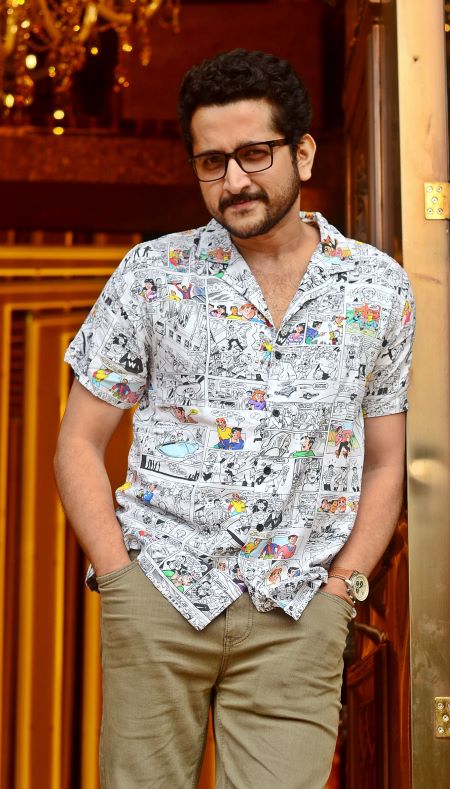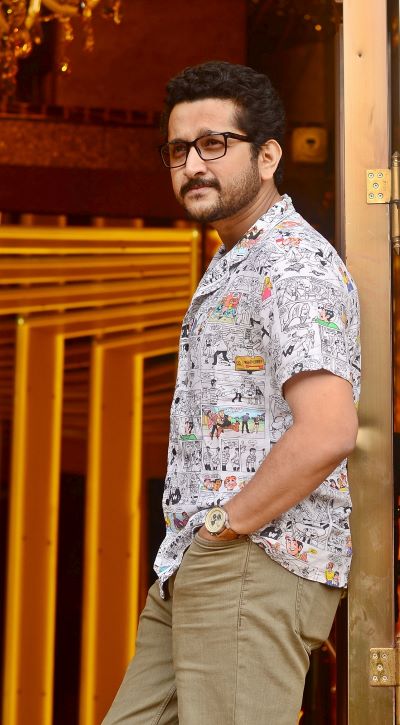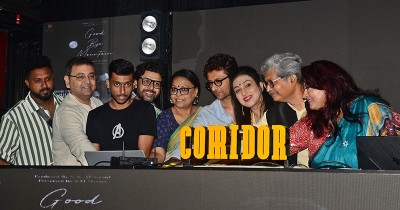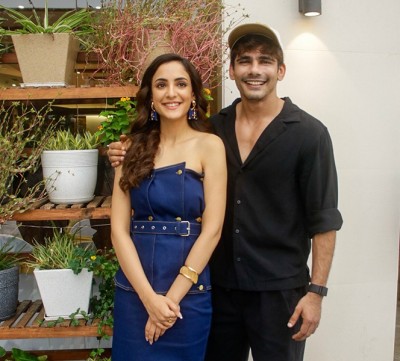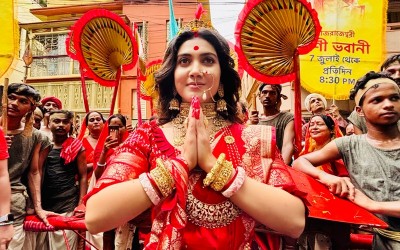Direction is my final calling: Parambrata Chattopadhyay ahead of Nikosh Chhaya release
Actor-director Parambrata Chattopadhyay's Nikosh Chhaya, the second installment of the Bhaduri Moshai series, is set to premiere on popular streaming platform Hoichoi on October 31 on the occasion of Bhoot Choturdoshi. A year after the success of the first installment- Parnashavarir Shaap- Parambrata goes candid with IBNS correspondent Souvik Ghosh on the series, tantrism and his current choices in career in an interview at The Flamboyant in Kolkata... Excerpts...
Q. You said Nikosh Chhaya is made on a bigger scale. What do you mean by that?
A. Last time when we were making Parnashavarir Shaap, the exoticism of the hills was already a gift for us. So it had already added a certain scale to it. But this time around, the story takes place against the backdrop of a very regular, suburban town, Barasat, where it's doubly challenging to sort of create an atmosphere of fear so in order to ensure that the atmosphere is rightly and duly created, we have increased the scale in terms of the way it was shot and the craft of shooting. It has been consciously made a little larger than life than last time so that the very regular places look scary and haunted.
Q. Was it shot in and around Kolkata?
A. Yes, in and around Kolkata but since the story is set in Barasat officially, we have tried to shoot at least 10-15 kilometers away from Kolkata where it's still very accessible to the city but at the same time, the houses and streets have a certain, slightly hinterland feel to it.
Q. How challenging is it to create the feel of a horror genre in the vicinity of places like even Barasat, which is relatively close to Kolkata?
A. The moment a story steps away from Kolkata and goes into a suburban town, one tends to think of the story being set in a big mansion of Serampore or Chandannagore but the fun thing about Nikosh Chhaya is that none of it takes place in a big mansion or anything like that. It happens in very regular places and haunts like by the rail yard or dilapidated storage house in the rail yard or small swampy forest areas where people don't visit after a certain time in the evening. I found it challenging to create the particular atmosphere in such very regular places that we all know about.
Q. What is your perspective when it comes to horror elements and tantrism?
A. I have a lot of interests in these practices and occult arts. The heed comes mainly from my academic interest in the history of tantric practices in the eastern part of the subcontinent. We the people of eastern India have a very interesting history which is dotted with a mixture between certain branches of Hinduism and Buddhism. We have an Islamic period as well in between. So the kind of rituals including our regular Devi pujas that we see in the eastern part of our country are predominantly tantric practices.
The practice and the history of tantrism in the eastern part of this country are thousand years old, at least, if not more. So I think it's very intricately linked with our culture, heritage and history. I find a lot of interest in it. I also find it very interesting how different it is from the kind of Hinduism that is practiced in the rest of India, especially in the north and west. The kind of Hinduism practiced in south India is essentially mixed with pre-Hindu and pre-Aryan traditions.
Q. Did you delve deeper into this field in the course of making Parnashavarir Shaap and Nikosh Chhaya?
A. Yes, absolutely. If I was not making Parnashavarir Shaap or Nikosh Chhaya, I probably wouldn't have dealt with it in such detail. I do want to be faithful and authentic about the things I portray despite having the cinematic liberties. I have always wanted to be authentic about my portrayal of such practices as much as possible and that is the reason I got consultants on board to advise us on such a subject.
Q. In an interview, you had said actor-directors are not taken seriously. Is people's perception towards you changing?
A. For me, yes... I think people have started taking me a little more seriously as a director after making so many films and series. (laughs). But usually the actors who become directors, barring a few, also try to fulfill their unfulfilled wishes of doing certain roles and I don't blame the people or industry peers and colleagues if they end up not taking them seriously. I make films because I want and love doing it the most.
But if I am becoming a director to sort of project my actor's self more, then it doesn't make sense. It's kind of self defeating as it defeats the purpose itself. Though being an actor was my primary identity, I have always wanted to be a director. I make films because I have studied. That should be the primary condition. I should not be a director to enhance my acting career. Probably this is the reason people take time to consider actor-directors seriously.
Q. But we have a lot of reputed actor-directors. People are talking about Shiboprosad Mukherjee, the actor, again after Bohurupi. Kaushik Ganguly, Anirban Bhattacharya too are praised both as actors and directors.
A. Yes, Shibu-da and Kaushik-da are phenomenal actors. A lot of people are unaware that when we started our respective journeys as actors 20 years ago, Shibu-da was actually quite an inspiration for us in terms of an actor. He was an actor that we would look up to. We would wonder why he isn't acting enough. Having said that, Shibu-da is known primarily as a director to the common people and the same goes for Kaushik Ganguly. People later came to know them as actors. But for Anirban or myself, people have come to know us as actors first and directors later.
Q. The audience loves you as an actor as much as a director. Is there an added pressure now to not deprive the audience from your acting self and balance the two roles?
A. After spending about a good 20-22 years in the industry, I as an artiste also need to decide which one is my primary calling. Once I decide that, there will be a certain shift. I am not quitting acting of course but I am directing more frequently than what I was doing five years ago. My frequency of working as a director has certainly increased in the last five years because that's my final calling. I am at an age where I slowly need to decide what's my calling and focus accordingly. I am not quitting acting but the balance between my two selves will be more even now as opposed to earlier when I would direct a project once in four-five years. Now I will be directing once or twice every year.
Q. You work in Bangladesh as well besides Kolkata and Mumbai. How confident are you to resume work in Dhaka where situation is still volatile due to political changes?
A. I don't think there'll be much of a problem. A lot of work is still happening between the two countries. We have an umbilical cord with each other. Political dispensations have changed earlier as well in Bangladesh, which has seen a lot of turmoil ever since its foundation (in 1971) and even in 1947 as East Pakistan. I don't think that the volatility is as bad as it is being projected. It is a little volatile because the diplomatic relations between the two countries are not clearly defined right now.
There is naturally a very anti-India sentiment going around in Bangladesh as its previous regime, which has been ousted, was viewed as very close to India. It's a matter of time. No version can be ignored right now but I think it's going to take some time. Things are evolving. It has only been little more than three months and things are still very much in a churn so we will have to wait for the next six-seven months to understand what's going on.
(Images by Avishek Mitra/IBNS)
Support Our Journalism
We cannot do without you.. your contribution supports unbiased journalism
IBNS is not driven by any ism- not wokeism, not racism, not skewed secularism, not hyper right-wing or left liberal ideals, nor by any hardline religious beliefs or hyper nationalism. We want to serve you good old objective news, as they are. We do not judge or preach. We let people decide for themselves. We only try to present factual and well-sourced news.





